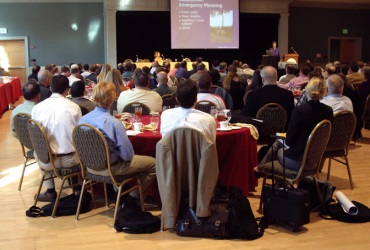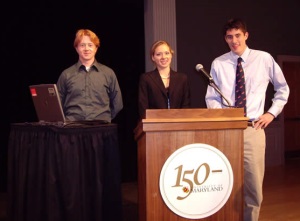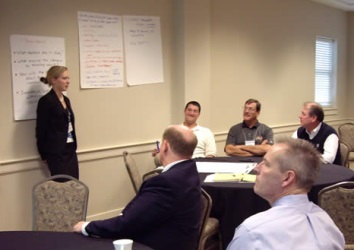Smart and Sustainable Campuses Conference
November 3rd and 4th, 2005
University of Maryland, MD
UConn Demonstrates Environmental Leadership, Taps Into Expert Water Conservation Advice
By: Melanie Murphy
 Like a revitalized river, ideas and innovations flowed energetically at the 2005 Smart and Sustainable Campuses Conference, held November 3rd and 4th at the University of Maryland. Hundreds of industry professionals, university administrators, facilities managers, and environmentally savvy students converged on College Park, Maryland to discuss environmental stewardship in higher education, share success stories, and collaborate on specific initiatives ranging from solid waste management to greenhouse gas emissions reductions.
Like a revitalized river, ideas and innovations flowed energetically at the 2005 Smart and Sustainable Campuses Conference, held November 3rd and 4th at the University of Maryland. Hundreds of industry professionals, university administrators, facilities managers, and environmentally savvy students converged on College Park, Maryland to discuss environmental stewardship in higher education, share success stories, and collaborate on specific initiatives ranging from solid waste management to greenhouse gas emissions reductions.
The University of Connecticut played an active role in the conference, represented by Rich Miller, Director of Environmental Policy, and a student/faculty team that has been working for the past year to promote water conservation on the UConn campus. Members of the team, Dr. Nelly Abboud, associate professor in the Department of Civil and Environmental Engineering, along with Honors students Nicholas AuYeung (Chem. Eng. ’06), Christopher Shores (C&EE ’07), and Melanie Murphy (MS ARE ’06), presented during an interactive workshop portion of the conference. They discussed their work on water monitoring and conservation efforts, and received advice and feedback from industry experts and facilities managers from peer institutions. UConn’s team was one of only six colleges and universities throughout the country chosen by the event sponsors, which included the U.S. Environmental Protection Agency. Members of the team received an all-expense paid trip to the conference and a small grant, in addition to the opportunity to present at the workshop and receive expert advice. Miller also made a separate presentation about UConn’s new environmental policies and sustainable design guidelines.
In-depth analysis of the University’s water use began last year with the senior engineering thesis of Russell Ward (ENVE ’05). Additionally, Murphy and Kate Wadach (Environmental Policy ’05) lent their unique insight as varsity athletes on the Women’s Track and Field and Lacrosse teams, respectively, into the monitoring and assessment of Athletics and the Student Recreation Facility.
 Together, the team has also monitored, inventoried, and assessed the water use of academic, residential, and dining services buildings throughout campus, resulting in objective data used to identify water use trends and abnormalities. The group’s information led to several recommendations and outreach activities that have continued this fall.
Together, the team has also monitored, inventoried, and assessed the water use of academic, residential, and dining services buildings throughout campus, resulting in objective data used to identify water use trends and abnormalities. The group’s information led to several recommendations and outreach activities that have continued this fall.
The students reflected the interdisciplinary approach taken by the water conservation team. Nicholas AuYeung is an environmental policy intern and senior studying chemical engineering with a minor in Environmental Engineering. Chris Shores is a junior, advised by Dr. Abboud, in the Civil and Environmental Engineering department. Melanie Murphy received her B.S. in Resource Economics in August and is currently pursuing a Masters in the same discipline.
Water conservation surfaced as a particularly relevant issue this fall after drought conditions, combined with pumping of UConn water supply wells located near the Fenton River, caused a ¼ mile portion of the river to run dry. UConn’s water supply system draws from the Fenton well field and four wells located near the Willimantic River. The success of voluntary conservation measures, which reduced water use by 100,000 to 150,000 gallons a day, helped to avert more severe environmental damage
Following their presentation, UConn’s team received feedback from Robert Heller of Aqualine Resources, Inc., a Boston-based resource management team. The discussion was further enhanced by consulting engineers in attendance and facility officers from a host of schools, among them East Carolina University (NC), Xavier University (OH) and Grand Valley State University (MI).
In addition to recognition and feedback, the University of Connecticut received a small grant to support further water conservation projects. The money will be used to create leak-prevention and conservation outreach signs and investigate new, low-flow fixtures.
In addition to EPA, the conference was co-sponsored by the Society of College and University Planning, the National Association of College and University Business Officers, the Association of Physical Plant Administrators, and the University of Maryland, which hosted the event at its main campus.
 As part of a separate speaker panel, Rich Miller also presented the accomplishments of the three-year young Environmental Policy Advisory Council (EPAC)to an audience that included university representatives and a host of environmental professionals from across the country. Among the accomplishments of EPAC are UConn’s Sustainable Design Guidelines applicable to all construction projects and Environmental Policy Statement, both of which garnered interest as universities and colleges increasingly look to articulate similarly assertive goals and standards. Miller highlighted several UConn sustainability initiatives over the past few years that have engaged students, faculty, and staff in helping to reduce the University’s ecological footprint in its daily operations.
As part of a separate speaker panel, Rich Miller also presented the accomplishments of the three-year young Environmental Policy Advisory Council (EPAC)to an audience that included university representatives and a host of environmental professionals from across the country. Among the accomplishments of EPAC are UConn’s Sustainable Design Guidelines applicable to all construction projects and Environmental Policy Statement, both of which garnered interest as universities and colleges increasingly look to articulate similarly assertive goals and standards. Miller highlighted several UConn sustainability initiatives over the past few years that have engaged students, faculty, and staff in helping to reduce the University’s ecological footprint in its daily operations.
In a welcoming address, Dr. Gerrit Knapp of the University of MD’s National Center for Smart Growth powerfully summarized the aim of the conference: to practice sustainability “not for sustainability’s sake but to solve problems.” With fresh ideas and renewed energy, the University of Connecticut is now even better-equipped to accomplish its goals.
Click here for the and here for the Water Conservation Presentation and here for the Sustainable Development Guidelines Presentation.
Many thanks to this year’s Smart & Sustainable Campuses Conference Sponsors:
- Society for College and University Planning (SCUP)
- Environmental Protection Agency (EPA)
- The University of Maryland—College Park
- The Association of Higher Education Facilities Officers (APPA)
- The National Association of College and University Business Officers (NACUBO)